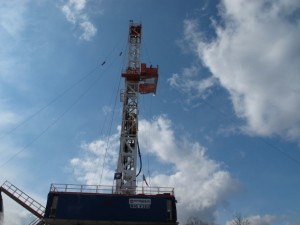This type of disclosure also makes sense when drillers use acid to eat away at shale rock and open up pathways for oil, according to Marshall. “If you’re doing an acid fracturing job, you also ought to disclose what was in the fluids.” The same goes for other requirements, he told KQED, including well and casing standards.
Concern about matrix acidizing – commonly known as acid jobs – has risen among California environmental groups in recent months. In May, several energy companies told Reuters that acidizing is a key part of drilling in the Monterey Shale, which is much more fractured and difficult to access than the other major shale formations that are fueling the country’s recent domestic oil and gas boom.
But the energy industry is pushing back against expanding the scope of California’s impending fracking regulations. “We recognize that our members will be operating in a much more tightly regulated environment in regards to hydraulic fracturing,” said Western States Petroleum Association spokesman Tupper Hull. “They’re prepared to do that,” he said, but warned “to pull in a bunch of other issues that really are unrelated from a technical point of view makes the likelihood of achieving those balanced, comprehensive regulations much more slimmer.”
In other words, major oil companies and their deep pockets would stop negotiating and start fighting against the measure.
“You Don’t Get To Break Your Well”
The idea that fracking and acidizing are completely unregulated in California is popular but false. The Department of Conservation’s oil and gas division treats them as one aspect of the broader drilling process, which it permits and regulates. The state enforces standards regulating the thickness and quality of the pipes and cement that keep oil, gas, fracking fluid and any other substance inside a well, and out of the ground.
The same rules apply to fracking and acidizing as any other aspect of the drilling process, said Marshall. “You don’t get to break your well, and if you break your well you have to fix it.”
Now, with California’s Monterey Shale slated as the next stop in the country's recent shale drilling boom, the Brown administration has begun the process of writing new rules specifically addressing fracking. Environmental groups have long been skeptical of the Department of Conservation’s oil and gas division. “This is an agency that has had a cozy relationship with the oil industry for nearly 100 years,” said Bill Allayaud of the Environmental Working Group.
That skepticism is the motivation behind SB 4. Pavley said she was worried that without legislative guidance, the division’s regulations would be weak and ineffective. The bill would tell the division what parts of fracking to regulate. “We have continued to push them,” Pavley said. “The regulations are getting better, but they’re still too weak.”
The Road Ahead For SB 4
The measure passed the Senate earlier this summer, and will soon go before the Assembly Appropriations Committee. Negotiations continue. Pavley and environmental groups want to require a separate permit for fracking, acidizing and other well completion techniques. That’s in addition to the paperwork drillers already file before constructing a well. The Brown administration’s proposed amendments remove this language and replace it with a requirement for drillers to simply “provide notice” before beginning fracking.
Pavley’s bill would make California the strictest state in the country when it comes to forcing drillers to justify trade secret claims that keep specific fracking chemicals from being posted on public websites. SB 4 would require drillers to explain who else knows about the chemical in question, how much that proprietary information is worth to them and how easily it could be duplicated by other companies. The governor’s proposed amendments strip away that language. Instead, drillers would simply designate certain chemicals as trade secrets. Jason Marshall suggested, however, that stronger requirements would be included in the administration’s next round of draft regulations, which will likely be released later this year.
Whether SB 4 passes or not, the Department of Conservation will implement new fracking regulations. The question is how stringent they will be. This is something the energy industry accepts and, according to spokesman Hull, embraces. “We understand there’s going to be prior permitting, there’s going to be full disclosure of the fluids…there’s going to be enhanced well monitoring, well construction. …All of those issues have been on the table and expected in the final regulations.”
